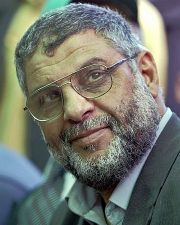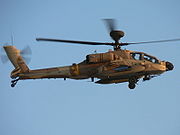Abdel Aziz al-Rantissi
| Abdel Aziz Al-Rantissi | |
|---|---|
 |
|
| Born | October 23, 1947 Yibna, British Mandate for Palestine |
| Died | April 17, 2004 (aged 56) Gaza City, Gaza Strip |
| Cause of death | Helicopter attack |
| Ethnicity | Arab |
| Alma mater | Alexandria University |
| Known for | Hamas leader |
| Religion | Islam |
| Spouse | Jamila Abdallah Taha al-Shanti |
Dr. Abdel Aziz Ali Abdulmajid al-Rantissi (Arabic: عبدالعزيز علي عبد ماجد الرنتيسي) (October 23, 1947 – April 17, 2004) was the co-founder of the militant Palestinian Islamist organization Hamas with Sheikh Ahmed Yassin.
Rantissi was Hamas's political leader and spokesman in the Gaza Strip following the Israeli killing of Hamas spiritual leader Sheikh Ahmad Yassin in March 2004.[1] Like most Hamas members, Rantissi opposed any compromise with Israel and called for the creation of a state of Palestine (including the whole of the State of Israel) through military exertion against the Jewish state. In addition, Rantissi was the most vocal of Hamas leaders to deny the Holocaust, claiming that the Holocaust never occurred as described by Western historians and that Zionists at one time supported and funded Nazi activities.[2]
He was considered a terrorist by the United States, the European Union, and Israel for organizing suicide bombings of civilians. Rantissi was quoted by the Chicago Tribune as saying, "We will kill Jews everywhere. There will be no security for any Jews, those who came from America, Russia or anywhere."[3]
However this alleged statement by Rantisi seems contradictory to Sheikh Ahmed Yassin himself who said that he was 'at peace with all people, even the Jews', but that he only advocated for the rights of Palestinians. However, Rantissi's statement in Arabic could have referred exclusively to Israeli Jews.[4]
Contents |
Personal life
Rantissi was born in Yibna near Jaffa. Following the 1948 Arab-Israeli War, his family fled to the Gaza Strip. He studied pediatric medicine and genetics at Egypt's Alexandria University, graduating first in his class. He was a certified physician, although he did not have a practice. In his time in Egypt he became a deeply convicted member of the Muslim Brotherhood. In 1976 he returned to Gaza to teach parasitology and genetics at the Islamic University.[5]
Rantissi was married to Jamila Abdallah Taha al-Shanti, who was elected to the Palestinian Legislative Council in 2006. He was also the father of six children.
Origins of Hamas
In 1987, four Palestinian civilians of the Jabalya refugee camp were killed in a traffic accident that involved Israeli settlers and soldiers.[6] According to Rantissi, he joined with Sheikh Ahmad Yassin, 'Abdel Fattah Dukhan, Mohammed Shama', Dr. Ibrahim al-Yazour, Issa al-Najjar, and Salah Shehadeh in instructing people to exit the mosques chanting Allahu Akbar ("God is great"). This was the start of the First Intifada, according to Rantissi, under whose leadership the organization that would subsequently come to be known as Hamas was formed later that year. "Intifada" is the Arabic word for "uprising", in this case an uprising against the Israeli occupation. In Hamas' version of the start of the Intifada, the rival PLO later joined forces with them, and a united leadership was formed. Historians dispute the Hamas-led version of the launching of the uprising.
Expulsion and return
In December 1992, Rantissi was deported to southern Lebanon, as part of the expulsion of 416 Hamas and Palestinian Islamic Jihad operatives, and emerged as the general spokesman of the expellees. Upon his return in 1993, he was arrested, but later released. He was also detained many times over longer periods by the Palestinian Authority, for his criticism of the PA and of Arafat, most recently in mid-1999. When Rantissi returned to his public position as "right hand" to Yassin, he remained one of the main opponents to any cease-fire and cessation of attacks inside Israel. During talks among the Hamas leadership both in Gaza and abroad and in its constant contact with the PA regarding terror activity, Rantissi, together with Ibrahim Macadma, controlled the tone of the Hamas leadership.
After the return of Sheikh Yassin to the Gaza Strip in October 1997 in a prisoner exchange following a failed Israeli attempt to kill Hamas's Jordanian branch chief Khaled Mashal, Rantissi worked closely with Yassin to restore hierarchic command and to reinforce cadre uniformity within a reorganized Hamas. Following the killing of Salah Shehadeh and Ibrahim Macadma, he became the political head and also acclaimed spiritual leader of Hamas, remaining its principal spokesman.
Failed Killing Attempt
Shortly after the failed killing attempt of June 2003, George Bush's envoy, John Wolf visited Mohammed Dahlan. During the meeting the Israeli policy of Targeted extra judicial killing was linked to the dysfunction of the "Road Map" to peace process.[7] In the wake of the attempted killing an upsurge in violence left 70 people dead.[7]
Leadership of Hamas spent in hiding
Rantissi's four week tenure as leader of Hamas was spent in hiding, once the public funeral for Ahmed Yassin, attended by large crowds, ended. On the day of his death, April 17, he came out of hiding to visit his family in Gaza City, arriving before dawn and staying till the evening. Shortly after he left the house he was killed.[8]
Selected timeline
On June 6, 2003, Rantissi broke off discussions with PA Prime Minister Mahmoud Abbas, who had called for an end to "armed resistance".
On June 8, 2003, Rantissi was responsible for directing the Hamas-led attack in which four Israeli soldiers were killed at the Erez Checkpoint in the Gaza Strip.
On June 10, 2003, Rantissi survived an Israeli helicopter attack on a car in which he was traveling. He was lightly wounded in the attack, which killed two civilians and wounded around thirty more, including 15 children under the age of 12.
On January 26, 2004, Rantissi offered "a 10-year truce in return for withdrawal and the establishment of a state". There had earlier been some rumored talks within Hamas about doing this but this time Rantissi announced that "the movement has taken a decision on this".
On March 23, 2004, Rantissi was named leader of Hamas in the Gaza Strip, following the killing of Ahmed Yassin by Israeli forces. Reuters: Rantissi named Hamas chief for Gaza – official
On March 27, 2004, Rantissi addressed 5,000 supporters in Gaza. He declared US president George W. Bush to be an "enemy of Muslims". "America declared war against God. Sharon declared war against God and God declared war against America, Bush and Sharon. The war of God continues against them and I can see the victory coming up from the land of Palestine by the hand of Hamas." CNN: New Hamas leader: Bush is 'enemy of Muslims'
Killing

On April 17, 2004, Rantissi was killed by the Israeli Army after they fired hellfire missiles from an Apache helicopter at his car. Two others, a bodyguard named Akram Nassar and Rantissi's 27-year-old son Mohammed, were also killed in the attack, and four bystanders wounded. Along with these deaths a mother and her five year old daughter were killed. Israeli army radio stated that this was the first opportunity to target Rantissi, without significant collateral damage, since he took the leadership of Hamas, alleging that he had surrounded himself with human shields since the killing of Yassin.[9]
Israeli Foreign Ministry spokesman Jonathan Peled said:
- "Israel...today struck a mastermind of terrorism, with blood on his hands. As long as the Palestinian Authority does not lift a finger and fight terrorism, Israel will continue to have to do so itself."
British Foreign Minister Jack Straw condemned the action:
- "The British government has made it repeatedly clear that so-called 'targeted assassinations' of this kind are unlawful, unjustified and counter-productive."
United States White House spokesman Scott McClellan said:
- "The United States strongly urges Israel to consider carefully the consequences of its actions..."
- "As we have repeatedly made clear, Israel has the right to defend itself from terrorist attacks."
Quotations
"The Israelis will not know security. We will fight them until the liberation of Palestine, the whole of Palestine." (The New York Times, March 22, 2003)
"All the land of Palestine is a part of the Islamic faith and the Caliph Omar bin al-Khattab declared it for all Muslims. Therefore, no individual or group has the right to sell it or give it up." (Kul al-Arab, January 9, 1998)
"If Israel was established in Britain, would you accept compromise?", to a British journalist, June 1993.
"We know Bush is the enemy of God, the enemy of Islam and the enemy of the Muslim people. America has declared war against God, [Israeli Prime Minister] Sharon declared war against God, and God has declared war against America, Bush and Sharon."
"It's death whether by killing or by cancer; it's the same thing. Nothing will change if it's an Apache (helicopter) or cardiac arrest. But I prefer to be killed by Apache."
See also
References
- ↑ Urquhart, Conal (April 18, 2004). "Israeli missile attack kills new Hamas chief". The Guardian (London). http://www.guardian.co.uk/israel/Story/0,,1194569,00.html. Retrieved April 23, 2010.
- ↑ "imra.org.il". http://www.imra.org.il/story.php3?id=18086. Retrieved 2007-06-18.
- ↑ Schmetzer, Uli (July 23, 2002). "Israeli strike kills at least 12 in Gaza ; Targeted Hamas chief among dead" (Abstract (verified in Factiva)). Chicago Tribune. p. 1. http://pqasb.pqarchiver.com/chicagotribune/access/140609411.html?dids=140609411:140609411&FMT=ABS&FMTS=ABS:FT&type=current&date=Jul+23%2C+2002&author=&pub=Chicago+Tribune&edition=&startpage=1&desc=Israeli+strike+kills+at+least+12+in+Gaza+%3B+Targeted+Hamas+chief+among+dead. Retrieved 2008-12-31. ""Now there will be an escalation," warned Abdul Aziz Rantisi, a Hamas leader. "We will kill Jews everywhere. There will be no security for any Jews, those who came from America, Russia or anywhere.""
- ↑ http://www.youtube.com/watch?v=58Vq6KuAsrk
- ↑ "Profile: Hamas leader Rantissi". BBC News. April 17, 2004. http://news.bbc.co.uk/2/hi/middle_east/2977816.stm. Retrieved April 23, 2010.
- ↑ "Dr Abdel Aziz Rantisi". The Independent (London). April 19, 2004. http://news.independent.co.uk/people/obituaries/article38342.ece. Retrieved April 23, 2010.
- ↑ 7.0 7.1 Guardian by Chris McGreal 'The real obstacle to peace is not terror, but sabotage by Sharon-backed army' 20 June 2003 General Shaul Mofaz, after the failed attempt to kill Dr Rantissi. In an opinion poll 40% said the attack [] had been aimed at derailing the road map.
- ↑ Myre, Greg (April 25, 2004). "nytimes.com". The New York Times. http://www.nytimes.com/2004/04/25/international/middleeast/25HAMA.html. Retrieved 2007-06-18.
- ↑ "israelnn.com". http://www.israelnn.com/news.php3?id=60974. Retrieved 2007-06-18.
External links
- Palestine Activation Group
- interview with Rantissi Kul al-Arab (newspaper), January 9, 1998 (the source for some of the information in this article)
- Hamas Leader Rantisi: The Holocaust – The Greatest of Lies Funded by the Zionists
- What the doctor orders – Interview by Amira Hass (Haaretz)
- the Guardian (newspaper)